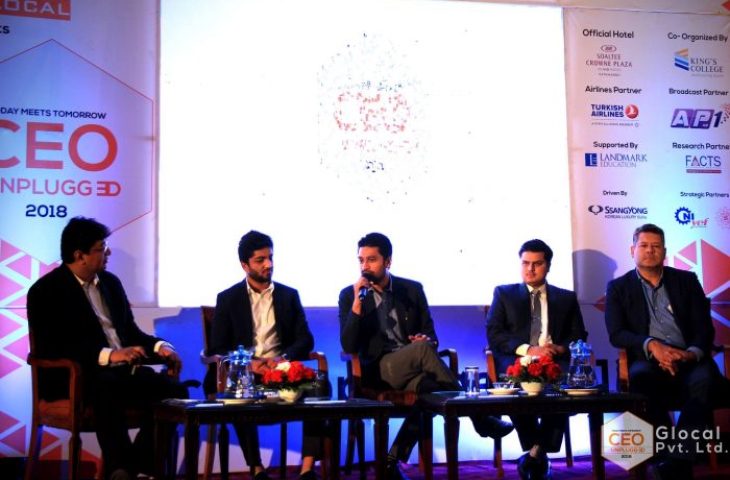This first panel discussion of CEO Unplugged 2018 organized by Glocal Pvt. Ltd. was Generational Change to Family Business: Mapping Young Minds. The panel looked into status of Nepal’s millennial’s who are set to welcome an economic revolution in the country’s entrepreneurial space. The panel’s main objective was to mirror the innovative changes that the young minds of the family have brought out in work, careers, family life and family business.
CEO Unplugged 2018 is a yearly forum organized by Glocal Pvt. Ltd. comprising series of panel discussion to establish a forum to discuss about contemporary business challenges, opportunities and futuristic view with a sight of experiential learning to the new comers in the business and students with an objective “Today Meets Tomorrow“.
The first panel discussion comprised of panelist; Shekhar Golchha, Director at HH Bajaj, Akhil Gupta, Director at Shanker Group, Satish Pokhrel, Director of Agni Cement, Siddhant Raj Pandey, CEO of Business Oxygen Pvt. Ltd. and moderator; Suman Shakya, Founder of Smart Paani.
Suman Shakya asked these young entrepreneurs about their experience of taking over the family business, challenges that came over when they want to bring a wave of change in the traditional family businesses, stereotypes that hit while working and wisdom of words they would love to share to the aspirants of the country.
In his opening remarks Suman Shakya roused an ambience of delight through his first question. Shakya commenced the panel by giving an instance of a car that attracts a crowd. Adding to the definite reason why people gather to look at the car, Shakya mentioned that the car lacked an engine but it was operating because of the ‘brand’ and not an ‘engine’. He prompted his first query of ‘Are you a brand or an engine of the enterprise?’
Akhil Gupta, Director of Shanker Group
” More than me saying I am a brand or an engine of the enterprise, it’s more of my work to speak. It’s a very old organization in Nepal and it was the largest manufacturing private sectors companies in Nepal. Juddha Power Motors was my initiative when I got back after studying and have done a lot of work. To answer your questions, I am still learning to become these parts and the integrity to make the engine working. It is a long process. I was lucky enough to have a family who set me in that direction of entrepreneurship.
There came challenges when I wanted to bring a change. But I was lucky enough to work with my cousins who wanted to move forward and understood our challenges.
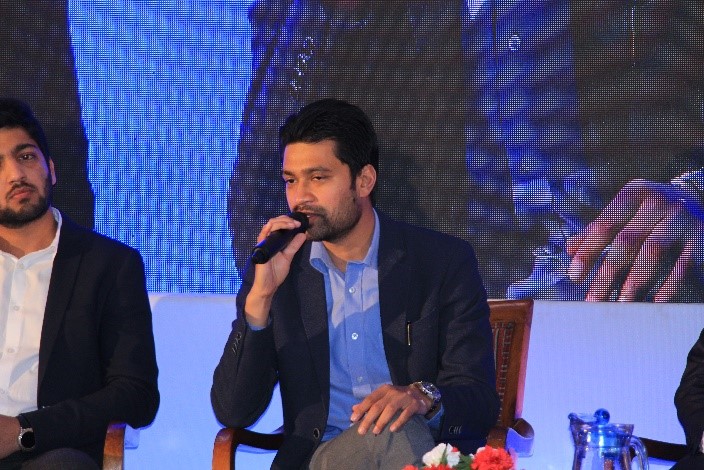
Akhil Gupta, Director of Shanker Group
Most of the companies have CEOs and it’s not a very old thing. We are trying to bring in the best knowledge. For example, for our motors business we got the best professional who understands the business, for alcohol business we have person from India working for the business, for steel business we have steel authority from India working for the business.
We do now have CEOs who are running our businesses. Primarily because they do understand certain things better than we do. But that is more in an operational front and if it would still come into planning. We are still learning as we are learning.
I’ll just share something from the last 8 to 9 years I have always done what I wanted to do. I also started out working at a bank in India and I realized that I didn’t want to work. I wanted to work on something of my own. I did my masters and came back. When I look forward I want to say, I have a big organic farm of my investment where I am myself one of the farmers. But what I have understood till date is just keep following whatever you think, whatever you dream and whatever your passion is. If you can manage it in the right way and if you can manage your resources, time, develop the skill sets required for your passion you will be set up at a right track.”
Satish Pokhrel, Director of Agni Cement
“As a matter of fact, our family are real entrepreneurs. They have come from a level to this level. It takes a lot of effort to achieve this level. If you see from the outside, it feels an easy job but to keep up with the expectations and work, the amount of effort we need to put up is extra.
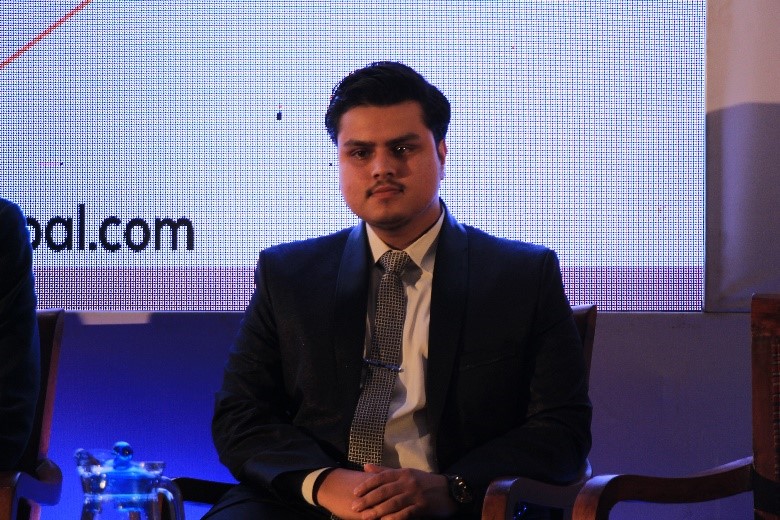
Satish Pokharel, Director of Agni Cement
First of all, when I joined the business I started from the bottom and worked as an employee. We have a policy in our family that we start from the bottom and grow ourselves to the top. I completed my bachelors at the end of 2013 and joined the company as an engineer. During the initials while your parents and uncle is your boss, there comes a conflict to treat them as your boss or family. I thought when I was leading there should be certain things I need to consider. For example, we have to show some level of respect to the senior workers. Otherwise things will be messed up. At the beginning this was the case. Recently, I was promoted to the director of the company and it was because of my family’s guidance. As a family business there were hurdles but then when you know how it works it is easy.
We have a platform for all of our siblings and our family. Recently, my cousin has also joined the business. Few of my siblings are in abroad but the ones who are here they are genuinely interested to join the business. So, they are not pushed to the top in the beginning but have to go through the struggle.
There is only one thing that I say to everyone. You have studied here, you’ve worked here, gained knowledge and you have gained experience. So, don’t go abroad. Nepal is a land of opportunities despite of the hurdles. Where there are gaps, there are opportunities to fill the gap, so commercialize it, and find a solution to it. But, don’t go abroad. This is a place where you want to be because this is a place of growing economy.”
Abhimanyau Golchha, Director of HH Bajaj
“I recently joined the company and it’s been 26 months. The expectation carries a lot of weight. If you have heard the saying, ‘Every problem comes with its layers’. From outside it looks like you are wearing a crown, when you take it off its pretty painful. So, in the first day itself people have a lot of expectations and there’s no room for error from the very start. There’s a lot to learn a lot from it but at the same time there’s a lot of advantages. For example, sometimes I can get a room for error. If I do an error in 8 out of 10 businesses I uptake, the remaining 2 that I do good in will be remembered. But at the same time there’s a lot of expectation which puts up a lot of pressure on you from the first day itself.
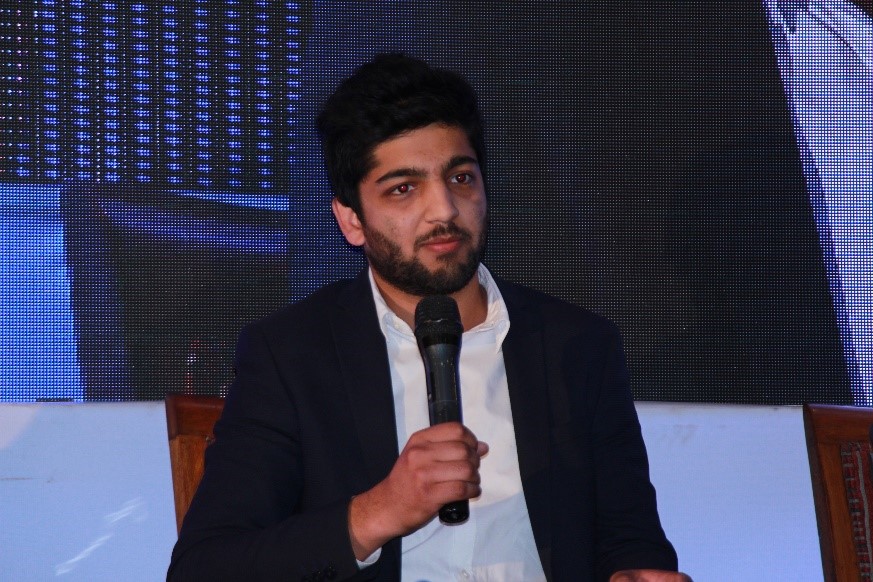
Abhimanyau Golchha, Director of HH Bajaj
I graduated two years ago and I worked in India for a couple of years. I worked in Delhi’s Samsung and then I worked in Pune for a year with ‘non-salary’. So, it’s not like that I directly graduated and directly entered to the company. In my company I pretty much started as a director. But I am not looking off at the entire company and I am looking at the automotive and three wheeled division of the company.
But once I become confident, I can take more and more companies. Coming to the other point, in our company we do have general managers who run day to day activities and I look up to the bigger picture of it. So, we do believe in a company run by a professional CEO and I think with that it gives you confidence. If you are ready to empower your team to run the day to day operations, you can take it much easier.
When I was in school I wanted to become a taxi driver. I used to love driving cars, getting paid and driving all day. That’s the best thing in the world. I think that I am fortunate enough that all the businesses I am involved in is my passion. Selling motorcycles is something I love and I can’t complain about that. I did engineering and business was not even in my bachelor studies.
This is something that I am loving every day. Every day I am learning so much. I cannot see myself doing anything else apart from this.
The educated people of Nepal don’t come back, it is very difficult to work on the economy. Even if you go abroad for your studies, you must come back and contribute to the society. In terms of all the chaos in Nepal, entrepreneurship is born in a chaos. There are a lot of opportunities that have not been utilized. If you can’t succeed as an entrepreneur in Nepal, there’s no other place. I think this is the best place to be an entrepreneur. Go off your dreams and be focused.”
Siddhant Raj Pandey, CEO of Business Oxygen Pvt. Ltd.
“As a private entity venture we do invest in businesses that are run by family and with partnerships. But before I get into the businesses we invest, worldwide 70 percent of the family business get fold up or sold up when the second generation takes over mainly because there are so many things the family business do not follow. This includes core structure of a business that make it to the third fourth generation. Keeping that main in mind, we as a private equity investor, invest in businesses run by family and small to medium enterprise.
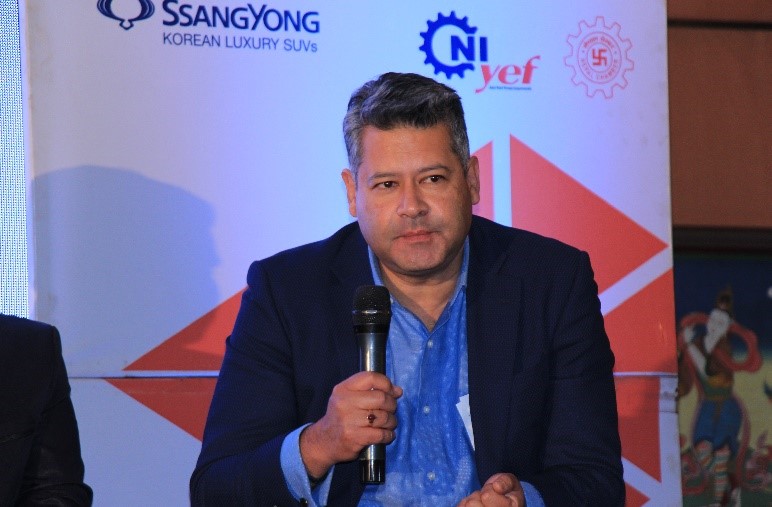
Siddhant Raj Pandey, CEO of Business Oxygen Pvt. Ltd.
We are not just brining capital into this business but we are bringing a partnership, handling over the company and doing change management. Most of the companies that are run in Nepal have a traditional management system. They don’t have financial framework, marketing branding, corporate government and transparency that are long resistant. These are the parallels that ensure a company to survive, so we teach these businesses on how to operate the management, succession planning, and professional management. We also teach these things to the families that want to give their less qualified and sons the position of CEO in the family business.
We are an outside intervention that bring capital as well as expertise so that we could dictate basic fundamental structure that makes the business stable.
What I want to make sure is that so that I am not misinterpreted. These fine young men who have done their time going to good universities, studying, coming back and they didn’t stay where they were studying- that’s a good point, that’s a plus. And the families that I have seen in the past 20- 25 years are investing in their children for abroad study, learn about what’s happening out there so that they can drive their businesses in the future and they are dealing with companies in India which are so compression. So, that’s a plus point.
Their grandfather/great grandfather/ father may not have been born to a business family. They created a business family and it’s all about entrepreneurship. So, it’s about passion. You’ve got to put your time in, work hard on it and the sky is the limit. There are no glass ceilings here. So, it’s up to you could be happy with whatever you want. But the point is dignity of labour is the most important thing. It doesn’t matter what you are, be what you want to be.”
Conclusion
‘Generational Change to Family Business: Mapping Young Minds’ being the first panel discussion of CEO UNPLUGGED made sure that entrepreneurs belonging to the business family should work harder to keep up with the name of their family and their family business. Four of these millennials gave an insight to the savor of their understanding of entrepreneurship in the panel. Not only did they converse about their journey to become what they are today, through the wisdom of words they shared was an insight to hard work being a key to success.
